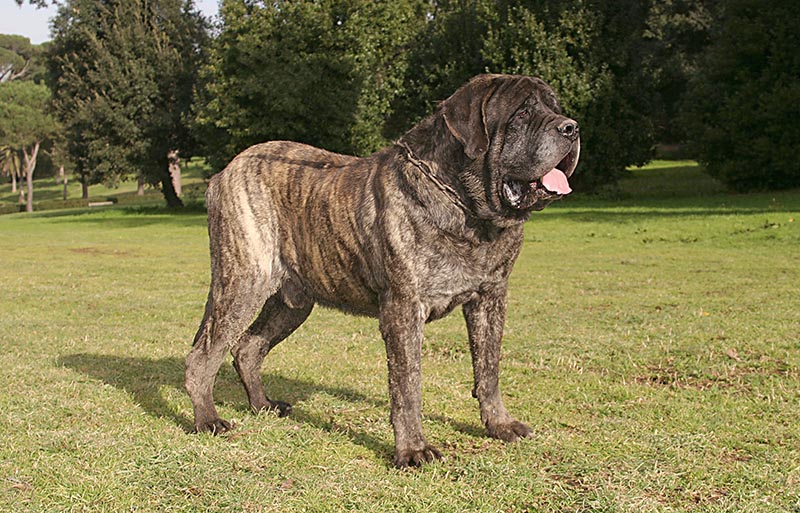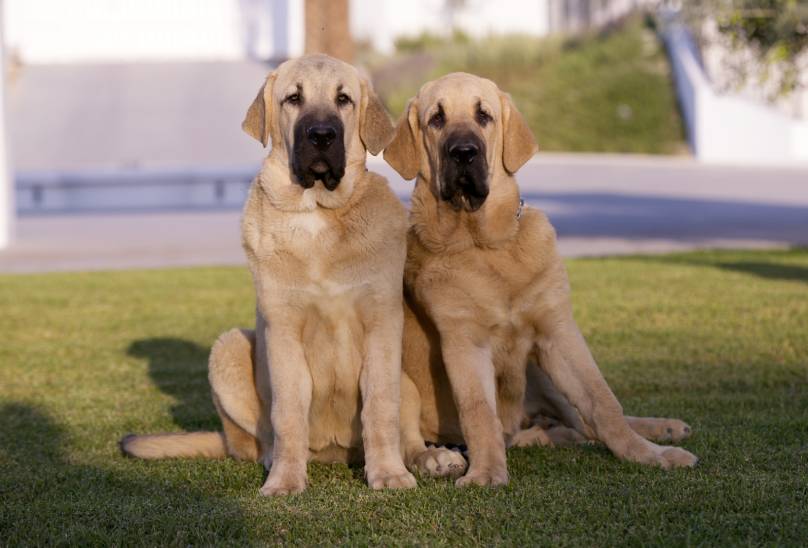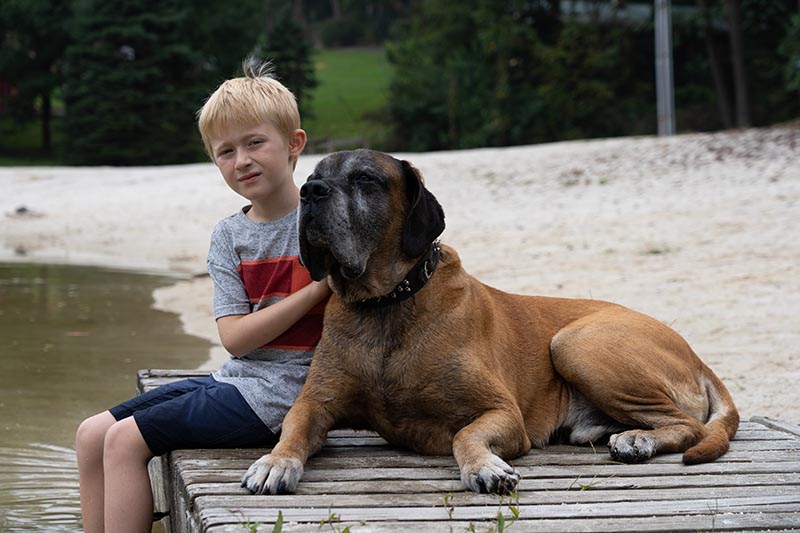Mastiffs have a reputation for being aggressive and sometimes even scary. Many people will avoid Mastiffs because of this reputation, and you can’t really blame people who are wary of them. Mastiffs are huge dogs, and some of them can be aggressive. But how aggressive are Mastiffs?
Most Mastiffs are not super aggressive. Many Mastiffs are lumpy couch potatoes. But not all of them are. Here is what you need to know about Mastiff aggression, their history, why Mastiff aggression is so feared, and how to prevent Mastiffs from being aggressive.
Are Mastiffs Aggressive?
Mastiffs can be aggressive. Some facets of society, like local governments, landlords, and insurance companies, have labeled the Mastiff an aggressive dog breed. That is because Mastiffs have a higher-than-average chance of exhibiting aggressive behavior. Obviously, not all Mastiffs are aggressive. Some Mastiffs are the sweetest dogs in the world, but others can be quite anxious and adverse to strangers.
One reason that Mastiff aggression is so feared is that Mastiffs’ immense size and power can make them incredibly dangerous if they are aggressive and not handled properly. The potential for violence is what makes local governments and insurance agents so cautious about Mastiffs.

How Aggressive Are Mastiffs?
Mastiffs are not hyper-aggressive dogs. When Mastiffs are at rest and not anxious, they are very sweet and relatively lazy. Mastiffs are not going to be up and moving around, patrolling your house for signs of danger. Mastiffs can often be found lying on the couch, listening for something out of the ordinary. Mastiffs can be wary of strangers, and they can be excellent guard dogs in that they alert when someone or something is coming. They are not attack dogs, and they are not on alert 24/7.
Some Mastiffs are more aggressive than others. The differences are often found in the way that they are socialized and trained. Some people feel safe with a protective Mastiff and will encourage behaviors that can be seen as aggressive. Other people enjoy Mastiffs for their size and cuddly loyalty but want nothing to do with possible aggression. A dog that is trained and encouraged to be protective will always be more aggressive than a dog that is well-socialized and rewarded for being sweet and lazy. Mastiffs can be both of these things, and the trouble is that you cannot know at first glance which type of Mastiff you are dealing with.
What Were Mastiffs Bred For?
Mastiffs are an ancient dog breed with roots going back as far as the Roman Empire. Mastiffs were bred and transported throughout the empire, making it as far north as the British Isles. Mastiffs were prized for their size, strength, and power. Many Mastiffs were bred as protectors and guard dogs. Before the rise of Ring Doorbell cameras and concealed weapons permits, people could only rely on their own senses and that of their dog to alert them to danger and help protect them. Mastiffs were often found on farms, in Roman-style compounds, and in manors as companions and protectors.
Since then, Mastiffs continue to be prized for their size, loyalty, and protective nature. The modern age does not require people to rely on guard dogs as much as they had to in the past, so there are more socialized and friendly Mastiffs than before, but generations of protective breeding and training are still present.

Mastiffs Can Be Dangerous
The crux of the issue is that while most Mastiffs are perfectly calm and safe, Mastiffs have the potential to be incredibly dangerous. Mastiffs can grow to absolutely immense sizes. Adult male Mastiffs can weigh as much as 230 pounds, which is more than most adult humans. They stand over 2 feet tall. Even the females typically weigh at least 120 pounds on the small end. That makes Mastiffs one of the largest dog breeds in the world by a long shot. It only takes a Mastiff getting out of hand for a second to scare or injure someone. Mastiffs’ large size makes them especially dangerous to children who are very small and do not have the knowledge to know when a dog is starting to feel ornery or aggressive.
Mastiffs were the sixth deadliest dog in the United States according to stats compiled between 2005 and 2017, with 14 deaths attributed to Mastiff attacks. That is far below the top dogs, Pit Bulls and Rottweilers (284 and 45 deaths, respectively), but it is still not zero. That is because the size and power of a Mastiff gives them ample potential to seriously hurt someone.
How to Prevent a Mastiff from Being Aggressive
The absolute best way to prevent a Mastiff from being aggressive is to prioritize socialization and training from a young age. Calm behaviors should be rewarded, and aggressive behaviors should be ignored. Dogs like Mastiffs should never be subjected to negative reinforcement training or fear training (yelling, striking, shock collars, etc.), as these types of training can actually create more anxiety and aggression.
Socializing a Mastiff means introducing them to a variety of different people, locations, and animals. A dog that is kept at home all the time with the same people around will naturally be curious or wary of the odd stranger that comes by once in a blue moon. A dog that gets out of the house and sees new people regularly or even takes long, diverse walks will have more information and experiences that will help them deal with situations in a healthy and calm manner.
Training and socialization are the two pillars of reducing the potential for aggression in any dog. Similarly, some people purposefully do not socialize their dogs and encourage aggressive behaviors to cultivate a stronger and more fearsome guard dog or protector.

Conclusion
Mastiffs are generally not very aggressive. Many people think that Mastiffs are always on alert and ready to strike, but that is simply not the case. Mastiffs’ reputations come from the fact that they can be aggressive, and their massive size makes any moments of aggression potentially dangerous. Most Mastiffs are sweet and lazy and have no issues with strangers at all, but some Mastiffs are anxious and do not do well around strangers, and that is what people zero in on.
Featured Image Credit: Mikanah, Shutterstock











